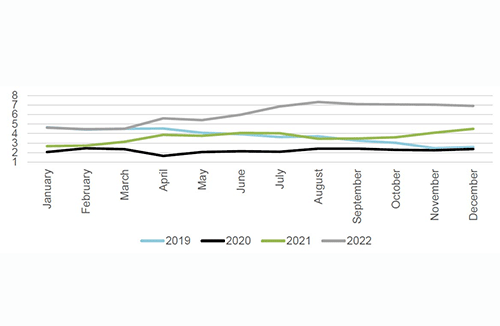Despite the World Bank forecast for the global economy to grow by 1.7% in 2023 and 2.7% in 2024, chief economists at the World Economic Forum (WEF) still expect the majority of global businesses and households to grapple with persistent headwinds throughout 2023. This is as many of the world’s captains of industries and chief economists gather this week at the annual WEF meeting Davos where its community of chief economists have cautioned that overall financial conditions remain tight. And, with little scope for significant loosening, these factors continue to put much of the world’s economy at risk of recession.
However, as the world puts another tumultuous year behind it, the latest survey of the WEF’s community of chief economists has indicated there are indeed tentative grounds for optimism, including the prospect of an easing of the cost-of-living and energy crises by the end of this year. The WEF also emphasised that continued weak global demand is seen as the biggest challenge for businesses to overcome in 2023, followed by the high cost of borrowing, high input costs and talent shortages.
In addition, geopolitical trends, specifically the Russia-Ukraine conflict, continue to dominate the global landscape and has been cited as the top factor shaping global economic activity in 2023.
“This wider economic impact channels through trade, investment, labour and technology flows, creating a myriad of challenges and opportunities for business,” a WEF report reads.
“At the other end of the spectrum, the fall of the cryptocurrency sector is expected to have relatively little spillover into wider financial markets and the majority of chief economists do not expect further economic disruption from Covid-19,” the report further noted.
The WEF’s January 2023 Chief Economists Outlook report was released to coincide with the group’s annual meeting which commenced on Monday.
“Although there are some grounds for optimism, such as easing inflationary pressures, many aspects of the outlook remain gloomy,” it said.
Close to two-thirds of the 22 chief economists surveyed by the WEF believe a global recession was likely in 2023, with 18% of them considering it “extremely likely.”
“Global growth prospects remain anemic, and global recession a risk high,” the report warned.
Moreover, corporations including Amazon, Goldman Sachs, and Salesforce have already announced retrenchments this year with the chief economists expecting job cuts to continue. Some 86% of the WEF survey respondents said they expect multinational businesses to cut operational expenses, with 78% expecting workers to be laid off. Most economists said they expected companies to pass higher costs onto customers, too.
On a more optimistic note, two-thirds of the survey respondents said they expected the cost-of-living crisis to become less severe by the end of 2023, while close to two-thirds said they were hopeful the energy crisis would improve by the end of the year.
Domestic outlook
Meanwhile, on the domestic front, inflation continued to moderate in December 2022. This is consistent with the view by local stock brokerage, Simonis Storm (SS) that inflation should follow a declining trend after peaking at 7.3% year-on-year (y/y) in August 2022.
“The annual rate of inflation came in at 6.9% y/y in December, compared to 7.0% y/y in November 2022. Inflation averaged 6.1% for 2022, in line with our initial expectations at the start of 2022. Goods inflation continues on a downward trend, posting 9.7% y/y in October 2022 compared to 9.8% y/y in the prior month,” reads an SS report.
According to the Bank of Namibia, the main contributor in reducing inflation was transport category, which rose 14.8% y/y in December 2022 compared to 18.3% y/y in November 2022. In its analysis, SS pointed out that hotels and restaurants as well as furniture shops are some of the main consumer price basket categories that remain on an upward trend.
“We maintain our view of observing persistently lower inflation rates going forward into 2023. Lower petrol prices will be the main driving force in lowering headline inflation in Namibia, followed by a stronger Rand during the first quarter of 2023 and continued supply chain pressure easing,” SS stated.


